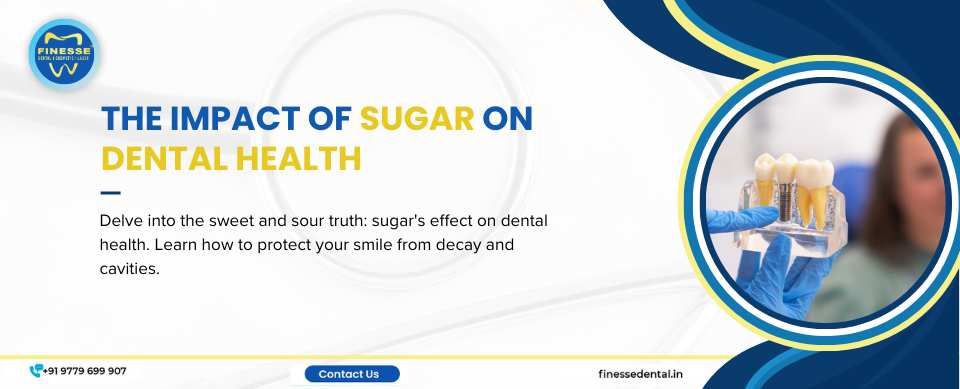- April 24, 2024
- Comment: 0
- Blog
The Impact of Sugar on Dental Health
Sugar consumption plays a significant role in dental health, with excessive intake linked to various oral health issues, including tooth decay, gum disease, and cavities. In this article, we’ll explore the impact of sugar on dental health, the mechanisms behind its harmful effects, and practical strategies for preventing sugar-related dental problems.

The Role of Sugar in Tooth Decay:
- Sugar serves as a primary fuel source for harmful bacteria in the mouth, particularly Streptococcus mutans, which metabolize sugar to produce acids.
- These acids attack the tooth enamel, leading to demineralization and eventually tooth decay if left unchecked.
- Frequent consumption of sugary foods and beverages provides bacteria with a continuous supply of sugar, increasing the risk of decay over time.
Understanding the Effect of Sugar on Teeth
Sugar consumption plays a significant role in dental health, with its effects extending beyond just satisfying a sweet tooth. Understanding how sugar impacts teeth is crucial for maintaining optimal oral health.
- Sugar and Tooth Decay: When we consume sugary foods and beverages, harmful bacteria in the mouth feed on the sugar and produce acids as a byproduct. These acids attack the tooth enamel, leading to demineralization and eventually tooth decay if left unchecked.
- Sugar and Gum Disease: In addition to tooth decay, sugar can also contribute to gum disease. The bacteria in plaque thrive on sugar, leading to the formation of plaque along the gumline. Over time, this can cause inflammation, bleeding, and gum disease if not properly addressed.
The Relationship Between Sugar and Gum Disease:
- In addition to tooth decay, sugar consumption can contribute to gum disease, also known as periodontal disease.
- Sugary foods and drinks promote the growth of bacteria in the mouth, leading to plaque formation along the gumline.
- Over time, plaque buildup can irritate the gums, causing inflammation, bleeding, and eventually gum disease if not addressed.
Strategies for Preventing Sugar-Related Dental Problems:
- Limit sugar intake: Reduce consumption of sugary foods and beverages, including sodas, candies, pastries, and sugary snacks.
- Choose healthier alternatives: Opt for fresh fruits, vegetables, whole grains, and dairy products as healthier alternatives to sugary snacks and desserts.
- Practice good oral hygiene: Brush teeth at least twice a day with fluoride toothpaste, floss daily, and use mouthwash to remove plaque and bacteria from the mouth.
- Rinse with water: After consuming sugary foods or beverages, rinse your mouth with water to help wash away sugar residue and neutralize acids.
- Visit your dentist regularly: Schedule regular dental check-ups and cleanings to monitor your oral health and address any issues before they escalate.
Healthy Alternatives to Sugar
While reducing sugar intake is essential for dental health, it’s also important to explore healthier alternatives to satisfy your sweet cravings.
- Fresh Fruits: Instead of reaching for sugary snacks and desserts, opt for fresh fruits like apples, strawberries, and watermelon. Not only are they naturally sweet, but they also contain essential vitamins and minerals that benefit overall health.
- Vegetables: Incorporating more vegetables into your diet can help curb sugar cravings while providing essential nutrients. Carrots, celery, and bell peppers are excellent options that offer a satisfying crunch and natural sweetness.
- Whole Grains: Choose whole grains like oats, quinoa, and brown rice over refined carbohydrates like white bread and pasta. Whole grains provide sustained energy and contain fiber, which helps regulate blood sugar levels and promotes overall health.
- Dairy Products: Dairy products like yogurt and cheese are not only rich in calcium and protein but also contain natural sugars like lactose. Choose plain or unsweetened varieties to avoid added sugars found in flavored options.
The impact of sugar on dental health cannot be overstated, with excessive consumption contributing to tooth decay, gum disease, and other oral health problems. By understanding the harmful effects of sugar and implementing practical strategies for prevention, individuals can take proactive steps to safeguard their dental health. From limiting sugar intake to practicing good oral hygiene and visiting the dentist regularly, adopting healthy habits can help protect teeth and gums for a lifetime of smiles.

